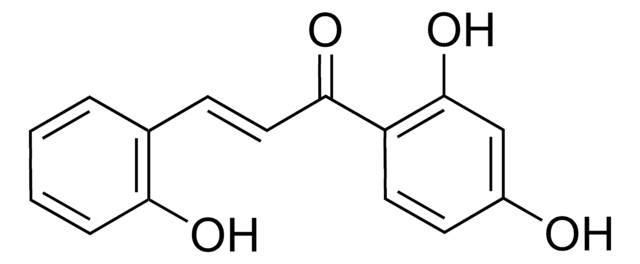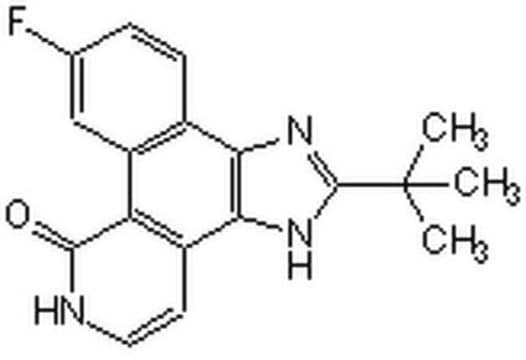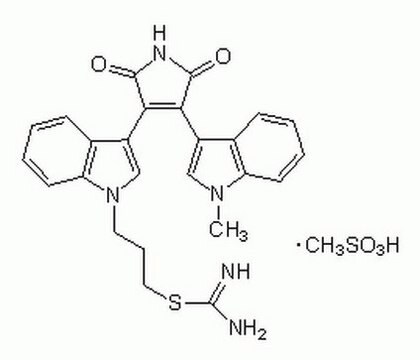420104
JAK3 Inhibitor II
The JAK3 Inhibitor II, also referenced under CAS 211555-04-3, controls the biological activity of JAK3. This small molecule/inhibitor is primarily used for Phosphorylation & Dephosphorylation applications.
Synonyme(s) :
JAK3 Inhibitor II, 4-[(3ʹ-Bromo-4ʹ-hydroxyphenyl)amino]-6,7-dimethoxyquinazoline, WHI-P154
About This Item
Produits recommandés
Niveau de qualité
Pureté
≥97% (HPLC)
Forme
solid
Fabricant/nom de marque
Calbiochem®
Conditions de stockage
OK to freeze
protect from light
Couleur
pale yellow
Solubilité
DMSO: 100 mg/mL
Conditions d'expédition
ambient
Température de stockage
−20°C
InChI
1S/C16H14BrN3O3/c1-22-14-6-10-12(7-15(14)23-2)18-8-19-16(10)20-9-3-4-13(21)11(17)5-9/h3-8,21H,1-2H3,(H,18,19,20)
Clé InChI
CBIAKDAYHRWZCU-UHFFFAOYSA-N
Description générale
Actions biochimiques/physiologiques
JAK-3
Conditionnement
Avertissement
Reconstitution
Autres remarques
Sudbeck, E.A., et al. 1999. Clin. Cancer Res. 5, 1569.
Goodman, P.A., et al. 1998. J. Biol. Chem. 273, 17742.
Narla, R.K., et al. 1998. Clin Cancer Res.4, 2463.
Informations légales
Code de la classe de stockage
11 - Combustible Solids
Classe de danger pour l'eau (WGK)
WGK 3
Certificats d'analyse (COA)
Recherchez un Certificats d'analyse (COA) en saisissant le numéro de lot du produit. Les numéros de lot figurent sur l'étiquette du produit après les mots "Lot" ou "Batch".
Déjà en possession de ce produit ?
Retrouvez la documentation relative aux produits que vous avez récemment achetés dans la Bibliothèque de documents.
Notre équipe de scientifiques dispose d'une expérience dans tous les secteurs de la recherche, notamment en sciences de la vie, science des matériaux, synthèse chimique, chromatographie, analyse et dans de nombreux autres domaines..
Contacter notre Service technique








